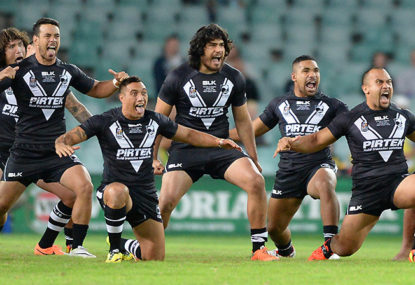It’s a stark, painful reminder for NRL-obsessed Australians of rugby league’s place in the world. While the Rugby Union World Cup final will receive wall-to-wall coverage, a league game involving England and the world’s number one nation, New Zealand, isn’t even on the box.
If you live in Australia, how may channels do you have at your house? Sixty, seventy? And a match involving two dozen NRL stars won’t be on any of them this Monday morning.
Apparently, Eurosport have brought the rights from the BBC and Rugby Football League. But the Australia arm of that network says it doesn’t have access to the feed, whether for legal or technical reasons.
Outside NSW, Queensland and the north of England the game at Hull’s KC Stadium is a rather insignificant event – full house notwithstanding.
At least, that’s until two million Brits turn on the BBC at tea-time on Sunday without any idea what they’ll see.
Rugby league fans in Australia sometimes struggle to comprehend what a regional sport it is in England, where Sunday’s live national TV audience is such a novelty that it almost seems scary.
“The last two years – the World Cup and the BBC coverage while we were in Australia – is what our players and our game need,” England coach Steve McNamara said.
“We need to be on that national stage. We need to be in London. The more exposure we get, the better for our players and the better for the game as well.
“I think to your Martin Offiahs and your Ellery Hanleys and your Shaun Edwardses. They are known throughout the country. There aren’t many rugby league players (now) who are known throughout the country.
“Them being on the BBC for the Challenge Cup final at Wembley… how many years did they go to Wembley? Eight years running. Everyone in the country saw the same players from Wigan on national TV eight years running.
“Now these ex-players are national stars. It shows you the power of the BBC in some regard.”
That’s why Australia’s reluctance to play internationals – and there are signs they want to play even less regularly – hurts the Brits so much. Without Tests, rugby league in the UK might as well not exist outside a string of towns and cities along the M62.
It’s utterly invisible.
Test football is its oxygen. And the NRL players who demanded time off along with the officials who humour them are putting a big fluffy pillow in the English game’s face.
But Monday morning’s blackout could be a watershed. Rugby league is popular in Australia, where it is a very sellable product. In England and elsewhere, they play it, broadcast it and advertise on it.
So, there is a bottleneck between supplier and consumer.
This is caused by any number of factors including the fact that Australian rugby league is squarely aimed at a suburban demographic that would rather follow other sports when it comes to international competition.
The metrics must say the small number of ‘trainspotter’ rugby league fans in Australia aren’t worth worrying about to the corporate behemoths that interact with the NRL.
But they are worth of the attention of Super League and the RLIF, which are smaller businesses.
They are not targeted directly because there is an unspoken, anti-competitive understanding between Australia and the game’s other countries that the NRL has sole access to consumers Down Under.
But the NRL and its partners have become too big to serve those consumers – otherwise, Sunday’s game would be on TV.
Rugby league fans in Australia who don’t drink Bundy, punt or visit Bunnings regularly are more marginalised than any of their brethren in Yorkshire or Lancashire.
So end what is effectively a trade barrier. Let Super League and the RLIF go in and target these people directly. Bypass the NRL and its clubs – whether they like it or not.
Super League is on Fox Sports three times a week. If the Queensland Cup can be on Australian TV once a week and sell sponsorships on that basis, then Super League should be able to sell more.
The RLIF and Super League have potential customers in Australia. So both those organisations need to be more aggressive in engaging those sponsors – even if it means undercutting the game in Australia, stealing sponsors from the game there.
A joint RLIF and Super League office in Sydney seems a no-brainer.
Imagine seeing Australian brands advertised on advertising hoardings in Super League? It happens in soccer. Manly used to get Auckland’s Park In The Bar advertising at Brookvale.
The RLIF could cold-call NRL sponsors offering to be the world soft drink partner of rugby league or the official goalpost-pad naming rights backer.
If the NRL and its clubs don’t like it – bugger them.
If things open up, it might get nasty for a while but as always the consumer will be the winner from increased competition and maybe the NRL will gain a greater appreciation of the game’s worldview.
What’s the worst the Aussies can do in retaliation? Tell the first Great Britain side in eight years to stay home because they refuse to play?





























































































